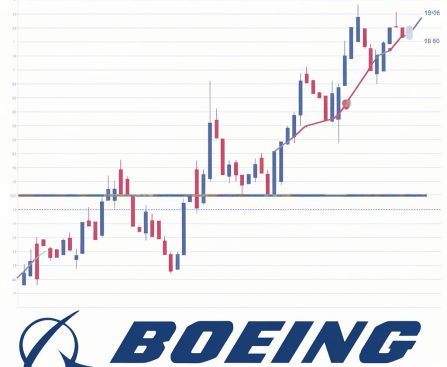Boeing, one of the world’s largest aerospace companies, has been making headlines recently due to its financial performance, operational challenges, and market fluctuations. For those keeping a close eye on the company’s shares (NYSE: BA), the latest updates offer a mix of both caution and optimism. Financial Performance Update In its latest financial report for Q4 2024, the company revealed a significant drop in revenue, down by 26.4% year-over-year to $16.21 billion. Boeing also reported a loss of $2.53 per share, compared to a $0.47 loss in the same period last year. This decline highlights the challenges it faces in stabilizing its operations amid supply chain disruptions and production delays. Despite these challenges, Boeing remains committed to its long-term goals, including ramping up production of its 737 MAX jets and improving delivery schedules. Production and Delivery Challenges A major concern has been delays in delivering the 737 MAX aircraft. Recently, Ryanair, a key customer, announced it would reduce its passenger forecast for 2026 due to these delays. While this has caused some turbulence, it also underscores the high demand for its aircraft, which could bode well for long-term growth if production challenges are addressed. Stock Market Performance As of January 28, 2025, the stock price stands at $176.13, reflecting a slight increase of 0.55% from the previous close. Shares have shown volatility in recent months, influenced by fluctuating investor confidence, supply chain issues, and global economic uncertainties. Recovery Strategies To counter its challenges, the company is focusing on: Additionally, Boeing is reportedly working on securing $35 billion in new funding to support its recovery plans and future projects. The Bigger Picture Despite current hurdles, the company remains a dominant player in the aerospace and defense industry. The demand for commercial aircraft is expected to grow significantly in the coming years, driven by increasing global air travel and fleet upgrades. This positions Boeing well for long-term recovery and growth, provided it can resolve its operational challenges. Takeaway for Investors The company’s recent performance may seem concerning, but its long-term potential remains strong. As Boeing works through its production and delivery issues, its shares could present an attractive opportunity for those willing to ride out the near-term volatility.
In recent weeks, Bitcoin has seen a dramatic surge in value, breaking past the $93,000 mark for the first time in its history. This remarkable milestone has reignited interest in the cryptocurrency market, drawing attention from investors, analysts, and technology enthusiasts alike. What’s driving this unprecedented growth, and how does artificial intelligence (AI) play a role in shaping the cryptocurrency landscape? Factors Behind Bitcoin’s Price Surge Several factors have contributed to Bitcoin’s meteoric rise: The Role of AI in Cryptocurrency Trading Artificial intelligence has become a pivotal tool in the cryptocurrency ecosystem, impacting trading strategies and market analysis in several ways: Implications for the Future Bitcoin’s recent surge underscores the growing influence of technology in financial markets. As AI continues to evolve, its integration with blockchain technology could revolutionize not only cryptocurrency trading but also the broader financial ecosystem. From enhanced security protocols to more efficient transaction systems, the potential applications are vast. For investors, understanding the interplay between AI and cryptocurrencies is essential. While Bitcoin’s value may continue to rise, the role of advanced technologies like AI will remain a cornerstone of the market’s development. Conclusion The rise of Bitcoin to $93,000 is a testament to the dynamic nature of the cryptocurrency market and the transformative power of artificial intelligence. As we move forward, the synergy between these two domains promises to unlock new opportunities and reshape the future of finance. Whether you’re a seasoned investor or a curious observer, keeping an eye on these trends will be crucial in navigating the ever-evolving world of digital assets.
The U.S. stock market is renowned for its dynamic nature, characterized by frequent fluctuations influenced by various economic indicators, corporate earnings, and geopolitical events. Understanding these market movements is essential for investors aiming to make informed decisions. Recent Market Performance As of January 16, 2025, major U.S. stock indices have exhibited notable activity: These modest changes underscore the market’s sensitivity to current economic conditions and investor sentiment. Factors Influencing Market Fluctuations Several key factors contribute to the volatility of the U.S. stock market: Historical Context Historically, the stock market has experienced significant fluctuations. For example, during the 2020 stock market crash, the Dow Jones Industrial Average recorded several trading days with point swings of at least 1,000 points, alternating between losses and gains. Investor Considerations Given the inherent volatility of the stock market, investors should: In conclusion, the U.S. stock market’s fluctuations are driven by economic data, corporate performance, and geopolitical events. By understanding these factors, investors can better navigate the market’s ups and downs. REDNOTE



